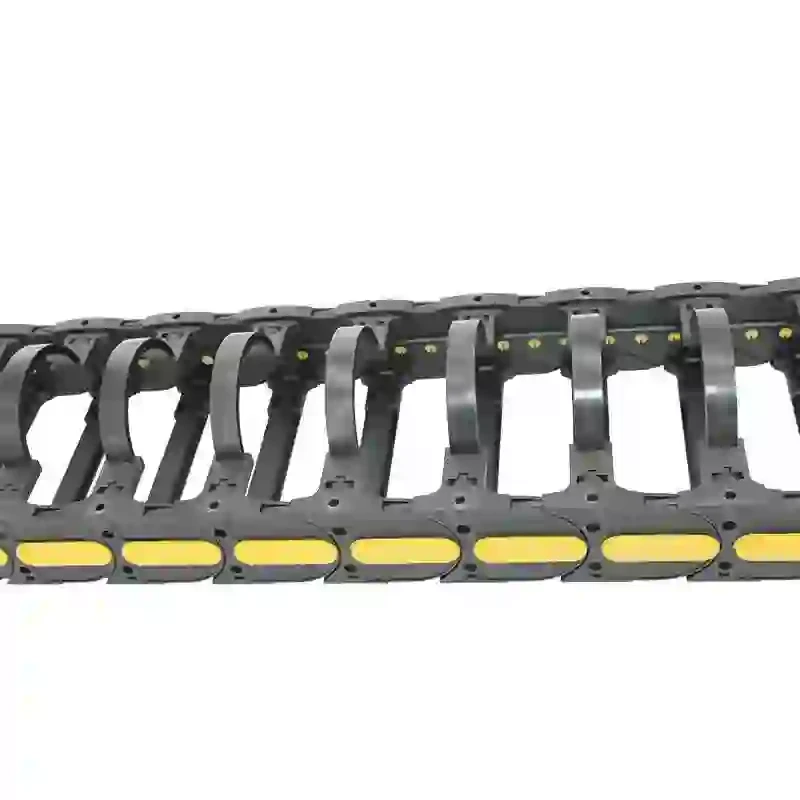Durable Plastic Flexible Cable Carrier Chains for Enhanced Equipment Mobility and Protection
The Versatility of Plastic Flexible Cable Carrier Chains
In the fast-paced industrial world, the importance of efficient cable management systems cannot be overstated. One of the most remarkable innovations in this field is the plastic flexible cable carrier chain, a vital tool that supports and protects cables and hoses during machinery movement. This article delves into the features, benefits, and various applications of plastic flexible cable carrier chains, highlighting their role in modern manufacturing and automation processes.
What is a Plastic Flexible Cable Carrier Chain?
A plastic flexible cable carrier chain, also known as a cable drag chain or energy chain, is a type of modular plastic conveyor that guides and protects flexible cables and hoses. These chains are engineered to be flexible, lightweight, and robust, allowing them to bend and twist while facilitating the movement of wires and cables safely within machinery. The design usually consists of interlocking links that can be customized in terms of length, width, and height, catering to specific industrial needs.
Key Features
1. Weight and Flexibility Plastic cable carrier chains are significantly lighter than their metal counterparts. This not only reduces the overall weight of the machinery but also minimizes the energy required to operate it. Their flexible nature allows them to navigate complex paths, adapting to the needs of different applications.
2. Durability Constructed from high-quality plastic materials such as polypropylene or nylon, these chains are resistant to wear, corrosion, and environmental factors. This durability ensures a longer lifespan, reducing maintenance costs and downtime for repairs.
3. Noise Reduction One of the significant advantages of plastic cable carriers is their quiet operation compared to metal chains. This attribute makes them ideal for environments where noise reduction is a priority, such as laboratories or workplaces focused on employee wellbeing.
4. Customization Manufacturers can tailor plastic flexible cable carrier chains based on the number of cables, their thickness, and the required bending radius. This level of customization increases their usability across a range of applications.
Benefits of Using Plastic Flexible Cable Carrier Chains
1. Enhanced Protection These chains provide excellent protection for cables and hoses from mechanical damage, abrasion, and environmental hazards. This protection prolongs the life of the cables, ensuring consistent performance.
plastic flexible cable carrier chain

2. Improved Efficiency By organizing cables neatly, plastic cable carrier chains prevent tangling and kinking, which can cause wear and impede operation. This organization leads to improved efficiency in systems where mobility is crucial.
3. Cost-Effective While the initial investment in plastic cable carriers may seem higher than traditional methods, their durability and reduction in cable wear often lead to lower total costs over time. Fewer replacements and maintenance needs enhance their overall value in industrial settings.
4. Versatile Applications Plastic flexible cable carrier chains find applications in diverse industries. They are commonly used in CNC machines, robotic arms, woodworking machinery, packaging machines, and even in various automotive assemblies. Their adaptability has made them a go-to solution for anyone looking to manage cables efficiently.
Application Areas
1. Automation and Robotics In automated environments, where machinery is constantly in motion, ensuring that cables do not tangle is crucial. Plastic cable carriers facilitate smooth movement, contributing to uninterrupted production processes.
2. Manufacturing In manufacturing setups, these chains are commonly used to manage power and control cables, helping to maintain a clean and organized workspace.
3. Transportation Systems They play a critical role in conveyor systems, protecting cables from wear and ensuring their longevity even under heavy use.
4. Electronics and Telecommunications In the electronics sector, precision and reliability are paramount. Plastic cable carriers help maintain the integrity of sensitive cables, preventing signal loss and interference.
Conclusion
The plastic flexible cable carrier chain is an essential component of modern industrial design, offering flexibility, durability, and efficiency. As industries continue to evolve, the demand for better cable management solutions will only grow, making these chains pivotal in driving innovation and productivity. Their versatility and robust nature empower industries to streamline operations, protect valuable equipment, and advance towards a more organized and efficient future. Whether in robotics, manufacturing, or transportation, plastic flexible cable carrier chains are here to stay, shaping the landscape of modern technology.








